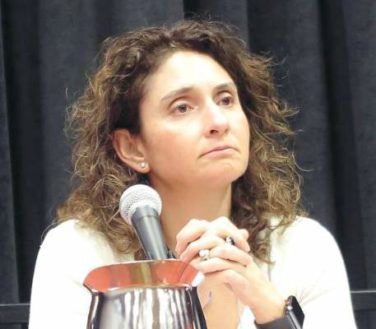AT THE ADA ANNUAL SCIENTIFIC SESSIONS
SAN DIEGO (FRONTLINE MEDICAL NEWS) – A year of treatment with once-weekly exenatide and once-daily dapagliflozin significantly outperformed either therapy alone for patients whose type 2 diabetes was uncontrolled on metformin, investigators reported at the annual scientific sessions of the American Diabetes Association.
At week 52, hemoglobin A1c, fasting and 2-hour postprandial glucose levels, body weight, and systolic blood pressure improved significantly more in the exenatide/dapagliflozin arm than in the dapagliflozin/placebo arm in the multicenter randomized, double-blind, phase III DURATION-8 trial, Cristian Guja, MD, said in a late-breaking poster. Exenatide/dapagliflozin also topped dapagliflozin/placebo on glycemic outcomes but not on measures of body weight or blood pressure.
Exenatide (Byetta, AstraZeneca) is a glucagon-like peptide–1 (GLP-1) receptor agonist, while dapagliflozin (Farxiga, AstraZeneca) is a sodium-glucose cotransporter–2 (SGLT-2) inhibitor. For the study, Dr. Guja and coinvestigators randomly assigned patients with type 2 diabetes and HbA1c levels of 8%-12% despite metformin therapy to receive one of three regimens: exenatide once weekly (2-mg subcutaneous injection) plus dapagliflozin (10-mg oral tablet), exenatide with daily placebo tablets, or dapagliflozin with weekly injected placebo. Between weeks 8 and 28, patients received rescue therapy with basal insulin according to progressively stricter fasting plasma glucose criteria that culminated at 200 mg/dL. From weeks 36 to 52, patients received rescue therapy if their HbA1c level exceeded 8%.
A total of 695 patients were randomized to one of the three study arms, and 564 (81%) patients completed 1 year of treatment. Improvements at 1 year resembled those at week 28. Between baseline and week 52, HbA1c levels fell by an average of 1.75% in the exenatide/dapagliflozin arm, 0.37% more than with exenatide/placebo (P less than .01) and 0.52% more than with dapagliflozin/placebo (P less than .01). Combination therapy also cut mean fasting plasma glucose levels by 63 mg/dL, which was 18 mg/dL more than with exenatide/placebo (P less than .001) and 23 mg/dL more than with dapagliflozin/placebo (P less than .001). Two-hour postprandial glucose levels dropped by 82 mg/dL with dual therapy, 18.4 mg/dL more than with exenatide/placebo (P less than .01), and 23 mg/dL more than with dapagliflozin/placebo (P less than .001). Recipients of dual therapy also lost an average of 3.3 kg over a period of 1 year and cut their systolic blood pressure by a mean of 4.5 mm, reductions that significantly exceeded those with exenatide/placebo but not with dapagliflozin/placebo.
Proportionally fewer patients needed rescue therapy in the dual-treatment arm (27%), compared with the exenatide/placebo arm (32%) or the dapagliflozin/placebo arm (38%). Most patients needed rescue therapy because their HbA1c levels exceeded 8%, not because their fasting glucose level exceeded 200 mg/dL, Dr. Guja said.
Combination therapy was “well tolerated, with no unexpected adverse events,” Dr. Guja reported. At 52 weeks, the groups had similar rates of serious adverse events, gastrointestinal adverse events, and adverse events leading to treatment discontinuation. In each arm, about 4% of patients stopped treatment because of adverse events. Dual therapy was associated with slightly higher rates of injection-site nodules (9%) and headaches (6%), compared with exenatide or dapagliflozin alone. There were no cases of severe hypoglycemia or acute renal failure. Glomerular filtration rates dropped by an average of 2 mL/ min per 1.73 m2 after 1 year of exenatide/dapagliflozin, by 1.2 mL/min per 1.73 m2 with exenatide/placebo, and by 0.8 mL/min per 1.73 m2 with dapagliflozin/placebo.
Baseline characteristics were similar between groups in DURATION-8. Glycated hemoglobin levels averaged 9.3% in each arm, fasting plasma glucose averaged 195-198 mg/dL, body mass index averaged 32-33 kg/m2, and systolic blood pressure averaged 130 mm Hg.
AstraZeneca markets Byetta and Farxiga and sponsored the trial. Dr. Guja reported having been on a speakers bureau for AstraZeneca, and she disclosed ties to several other pharmaceutical companies.



